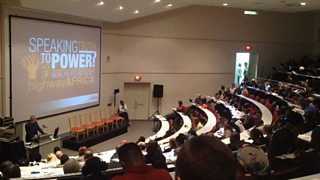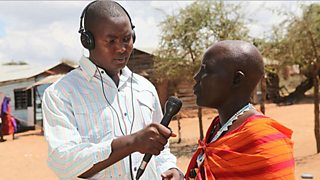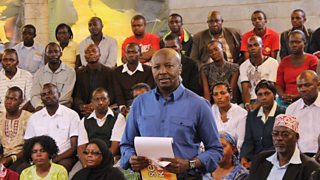��������’s 'API': partnerships to bolster journalism in Africa
Peter Horrocks
Director, �������� Global News
Tagged with:
Last week I addressed , a group of African journalists, academics and media-linked professionals, in Jamestown, South Africa on the ethics of journalism.
I acknowledged to the audience that it may have seemed an odd time for a British journalist to mount a defence of ethical journalism, with the UK's phone-hacking scandal (when journalists intercepted voicemails of hundreds of people) so fresh in people’s memories. The uproar, sackings, resignations and, in the case of the News of the World, newspaper closure, resulted in a public enquiry whose conclusions urged reform.

But ethics in journalism is the same the world over, the context will change and the support structures differ, but journalists are always operating in challenging environments that can constrain what we do. I suggested that a set of values that shape ethical journalism should be the same everywhere.
I’d arrived in Jamestown direct from Nairobi where I’d taken part in a . One of the most interesting discussions came from a group of Kenyan journalists reflecting on this year’s elections, who said they felt that there had been insufficient examination of the past records of candidates and parties. But this was preferable, they said, to the inflammatory roles played by partisan media in previous elections.
It struck me that the ethical framework described - in an honest and frank way - was not one where the interests of truthful reporting on behalf of the audience came first. Instead the unethical mistakes of the media organisation stemmed from putting the concerns of others – chiefly the owners and their affiliations – first. In the many places of the world where journalism is undervalued and underpaid, the urge to join a culture of ‘brown-envelope’ backhanders can be tempting. Look again to the UK phone-tapping scandal, the pressure to boost dwindling circulations and revenues through sensationalism spurred that unethical drive.
The �������� is committed to upholding the best traditions of journalism. The values, the editorial guidelines, the checks and balances we put in place, are designed to help deliver strong and impartial news. We don’t always get it right, but training, principles and guidelines help. And increasingly the �������� is also committed to supporting and working in partnerships with the many remarkable individuals and organisations in Africa (and more widely) who are practising great journalism under immensely difficult circumstances. As a profession, often working in dangerous, pressurised settings, we need to work together to support each other.

So how can the �������� help tackle some of the shortcomings in journalism? We make our editorial guidelines freely available on the �������� website. We also provide free training on the . We invest in new TV programmes, this year for example, launching new TV programmes about Africa on �������� World News and Swahili TV. And last week we announced the creation of an African business unit, creating stories about Africa’s business transformation in all parts of the continent.
But we are conscious that investment needs to be of benefit to the wider media sector too. In Nairobi we recently signed an internship programme with the journalism faculty at the . The �������� has also arranged training attachments for journalists from a number of partner radio and TV stations across the continent.
We now intend to build further on that. In the year to come the �������� will be agreeing a number of ambitious content-sharing partnerships with media houses both large and small in Africa. This plan we are calling the ��������'s API - Africa Partnership Initiative. We hope our partners will benefit from exposure to high �������� ethical standards and the ability to tell stories of Africa to the world. And the ��������'s audiences will benefit from the broader range of content and viewpoints that media organisations who commit to high standards can provide.
Another way we support ethical standards in African media is through , working with African journalists, broadcasters and government and non-government organisations to help the development of African media. Our projects are supporting not only large-scale broadcast debates but also community media and journalists working in some of the most remote and difficult places on the continent.

�������� Sema Kenya and its presenter Joseph Warangu.
It all points to a wider trend too, as there is growing recognition of and interest in the role of media in a rapidly changing, information-rich world. And there are very encouraging signs from the United Nations in further recognition of this. Earlier this year the UN's High Level Panel, tasked with updating the Millennium Development Goals, made a number of recommendations. Among the 12 new goals they proposed is one on good governance which aims to: “Ensure people enjoy freedom of speech, association, peaceful protest and access to independent media and information.”
This is a highly significant addition to the international development programme, based on a large body of academic literature which shows conclusive links between the strength of independent media, their ability to promote good governance and positive outcomes in terms of human development.
The role of balanced and ethical reporting seems more important than ever, as the challenges and pressures are perhaps greater than they ever have been. While many more millions of us can access information quickly are the sources credible and rigorous? And it is in this context of building strong and reliable media partners that I'd like to see the �������� developing in two-way collaboration. It's about checks and balances, rather than cheque book journalism.
Related links
Follow �������� Media Action on and
